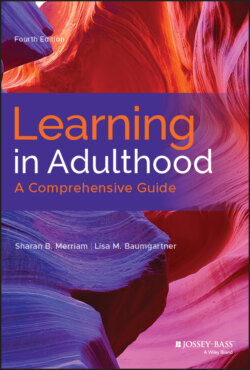Читать книгу Learning in Adulthood - Sharan B. Merriam - Страница 41
Summary
ОглавлениеLearning opportunities for adults are found in a variety of settings, from formal institutions to the Internet, to one's home or place of employment. The importance of understanding this vast array of learning opportunities for adults is twofold. First, acknowledging prior knowledge and experiences of learners, wherever gained, is important to the practice of adult educators. Second, if more than just formal types of adult education are made visible, individual learners, even those without formal schooling, may be better able to recognize their abilities and skills as lifelong learners.
There are three primary types of opportunities or sites in which learning occurs for adults: formal settings, nonformal settings, and informal or self-directed contexts. A fourth site explored in this chapter is online learning, which spans formal, nonformal, and informal settings. Although the categorization of these learning opportunities and the language used within these categories help us think about learning, what is more crucial is the recognition that learning opportunities come in many shapes, forms, and places. The most critical actions that educators of adults can take is to recognize the equal importance of the various types of adult learning and advocate that people use them in whatever situation or setting they find themselves.
A second section of this chapter explored the concept of organizational learning and its manifestation in the learning organization. In learning organizations, learning—whether done by individuals, groups, or the organization as a whole—is a central, valued, and integral part of organizational life. The heart of the learning organization is the willingness of organizations to allow their employees and other stakeholders related to the organization to suspend and question the assumptions by which they operate, then create and examine new ways of solving organizational problems and means of operating. This process requires that people at all levels of the organization be willing to think in a systems framework, with the emphasis on collective inquiry, dialogue, and action. Creating learning organizations could allow educators of adults, whether they are associated with formal or nonformal settings, to develop learning communities in which change is accepted as the norm and innovative practices are embraced.
Finally, we reviewed the evolution of the concept of lifelong learning, which has replaced lifelong education. Lifelong learning is a broader term than lifelong education because it incorporates all forms of learning, not just the formal educational system. Lifelong learning recognizes the prevalence and value of nonformal and informal learning along with the traditional formal system. This broader perspective can be seen in practice in some societies' efforts to implement lifelong learning in their societies, communities, and learning cities and regions. The term learning society is an attempt to capture these efforts.
